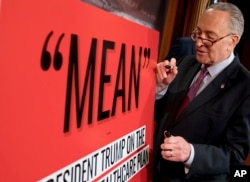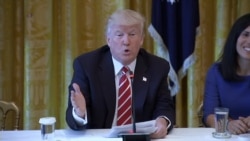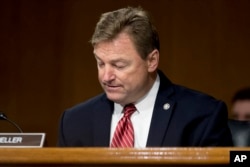After weeks of closed-door negotiations, Senate Republicans unveiled a draft bill to overhaul America's health care system and replace “Obamacare,” drawing criticism from Democrats and expressions of concern from some moderates as well as conservatives in their own party.
In what is seen as an attempt to make good on a longstanding Republican pledge to voters, the legislation would end the health care law's requirement that most Americans buy health insurance, phase out federal subsidies for purchasing a plan, and scale back funding for Medicaid, which covers health care costs for the poor and disabled.
“Obamacare isn't working,” said Senate Majority Leader Mitch McConnell, a Kentucky Republican, referring to former President Barack Obama's signature 2010 health care law. “It's time to act.”
Provisions of bill
The Republican plan provides tax incentives to help Americans pay for health care and repeals most Obamacare taxes on higher-income Americans. Democrats have blasted the bill as a tax cut for the rich masquerading as a health care plan.
“It cuts health care for those who need it most just to give a tax break to those who need it least,” said Minority Leader Chuck Schumer, a New York Democrat.
McConnell is pressing for a Senate vote on the bill next week, before Congress adjourns for the July 4 Independence Day holiday. Democrats objected to rushing a vote on a bill written in secret without a committee hearing on its merits.
“I can certainly understand why Republican leaders do not want to give people time to see what's in this bill,” said Democrat Patty Murray of Washington state. “They shouldn't get to jam it through without the public knowing good and well what they're up to.”
WATCH: Trump on health care act
Republicans countered that a more deliberative, bipartisan process would have been possible if Democrats had joined them in the push to end Obamacare.
“Given the refusal of our Democratic colleagues to participate in the process, this is the only way we can come to the rescue of the people who are being hurt by the meltdown of Obamacare,” said Republican John Cornyn of Texas.
That message was echoed by President Donald Trump, who wrote on Twitter: “Democrats would do much better as a party if they got together with Republicans on Healthcare … Obstruction doesn't work!”
Obama weighs in
Later Thursday, President Obama posted on Facebook: “The Senate bill, unveiled today, is not a health care bill. It's a massive transfer of wealth from middle-class and poor families to the richest people in America. It hands enormous tax cuts to the rich and to the drug and insurance industries, paid for by cutting health care for everybody else.”
Millions of Americans have gained health care coverage since Obama signed the Patient Protection and Affordable Care Act into law in 2010. And some of Obamacare's popular provisions, such as allowing young people to remain on their parents' health care policies until the age of 26, are retained in the Republican proposal.
But even Democrats acknowledge Obamacare's shortcomings, from spiraling costs of health care plans to a dwindling number of health care providers participating in exchanges across the nation.
While Democrats insist Obamacare can be fixed and improved while retaining its core structure, Republicans have insisted on “repeal and replace” as the only solution.
Now, Republican unity is being put to the test. Within hours of the proposal's unveiling, several Republicans signaled misgivings.
Nevada's Dean Heller, a moderate up for re-election next year, promised to read the proposed legislation, but, in a statement, said, “I have serious concerns about the bill's impact on the Nevadans who depend on Medicaid.”
Some Republican misgivings
At the same time, four conservatives said they are “not ready” to vote for the bill.
Republicans Ted Cruz of Texas, Mike Lee of Utah, Rand Paul of Kentucky and Ron Johnson of Wisconsin issued a joint statement saying, “It does not appear this draft as written will accomplish the most important promise we made to Americans: to repeal Obamacare and lower their health care cost.”
With Republicans numbering 52 in the 100-member Senate, they can afford to have only two members not vote to pass the health care bill, given what is expected to be unified Democratic opposition.
If the Senate passes the Republican plan, focus would shift to the Republican-led House of Representatives, which last month passed its own health care bill that Trump is reported to have labeled “mean.”
If the House passes the Senate bill intact, it would go to the White House for Trump's signature.
But ultra-conservative House members are already hinting at dissatisfaction with the Senate proposal.
“Reviewing the Senate #healthcare bill — looking forward to going to Conference," tweeted Freedom Caucus Republican Representative Mark Meadows, signaling an intention to press for changes in the Senate bill that, if adopted, would require a new round of votes in both houses of Congress.
Health care accounts for roughly one-sixth of the United States' economy.
Wayne Lee contributed to this report








